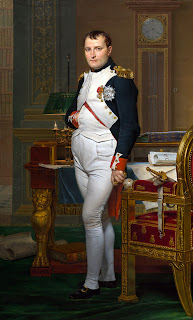Mrs. Allan Melville, of New York, gave a box party to see Lydia Thompson, on Saturday evening to Senator Fair, Judge and Mrs. MacArthur, Miss Carrie Lathers and Mr. Coleman. After the play a supper was partaken of at Wormley’s.Lydia Thompson was then appearing in Oxygen, "one of the stupidest burlesques that have ever been placed upon the stage" according to one contemporary critic who nevertheless praised its star as a "true burlesquer":
-- Evening Star, April 5, 1886; found at Genealogy Bank
"She dances with her old agility, sings fairly and is graceful in her acting."At any rate, this attending and hosting parties in high society was very much in the line of Jane Louise Dempsey Melville.
--Washington, D. C. Critic-Record, May 22, 1886
Update 1: The newspaper notice lists "Mrs. Herman Melville" among the reception guests, but is that a mistake for "Mrs. Allan Melville," widow of Herman's deceased younger brother?
Certainly Elizabeth Shaw Melville was well connected as the daughter of Judge Shaw, especially in Boston, but those elite names in the New York Graphic society item seem more like social acquaintances of Jane Dempsey Randolph Melville (1824-1890). And neighbors, maybe? Mrs. Allan Melville's home was still on 35th Street, near to the Townsends' home on 34th where the party for Madame Lucca took place. In the New York Tribune for December 3, 1886, "Mrs. Allan Melville" is listed under the heading "Musical and Dramatic Notes" among subscribers for a "substantial farewell testimonial" to Steve Massett (celebrated "Jeems Pipes" of Pipesville in California).
I meant to follow up on this before now, but forgot about it until seeing this one show up in the gallery of popular posts at Melvilliana.
And in high society. From the New York Daily Graphic, Friday, May 1, 1874:
PERSONALITIES.
... A very pleasant reception was given by Mrs. John D. Townsend, at her residence in West Thirty-fourth street, on Wednesday evening, in honor of Madame Lucca. Among the guests were Mrs. ex-Judge Roosevelt and daughter, Mr. and Mrs. Lawrence Turnure, Mrs. Herman Melville, and Mrs. John T. Beeckman. The music was by Professor Eben's orchestra, and the floral display is understood to have been very fine.
Found at Fultonhistory.comLater, to clarify: Despite the impression created by Google search results, the portrait below is a Guy Little Theatrical Photograph in the V&A collections, of opera singer Pauline Lucca--not Herman Melville's wife! Pauline Lucca (1841-1908) was a "prominent operatic soprano," born in Vienna. Rivalry with Mathilde Mallinger reportedly motivated her triumphant US tour, 1872-1874.
 |
Photograph of Pauline Lucca, late 19th c. Guy Little Collection Copyright: © Victoria and Albert Museum, London |
Mrs. John D. Townsend was Elizabeth A. Delano Swan Townsend, the former Miss Delano Swan of Boston. Her husband was the "well-known criminal lawyer" John Drake Townsend (1835-1896). Townsend wrote the posthumously published indictment of Tammany Hall, New York in Bondage (1901). Both Townsends made the news for their support of women's suffrage.
"Mrs. ex-Judge Roosevelt" is probably the former Cornelia Van Ness, "for many years queen in the leading society of New York" and wife of then ex-Judge James John Roosevelt (1795-1875). Appleton's Cyclopaedia acknowledges her "good service in organizing hospital and charitable associations for the aid of the National troops during the civil war" and later support of New York charities.
Lawrence Turnure at his death in 1899 was "one of the best-known bankers of New York." Mrs. Lawrence Turnure was the former Jane Redfield.
Mrs. John T. Beeckman and her husband are unknown to me at this point. Connected with the old Albany Beeckmans?
Looks like Eben's Orchestra kept busy playing at all kinds of New York social events...





